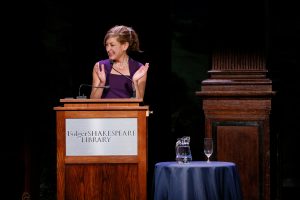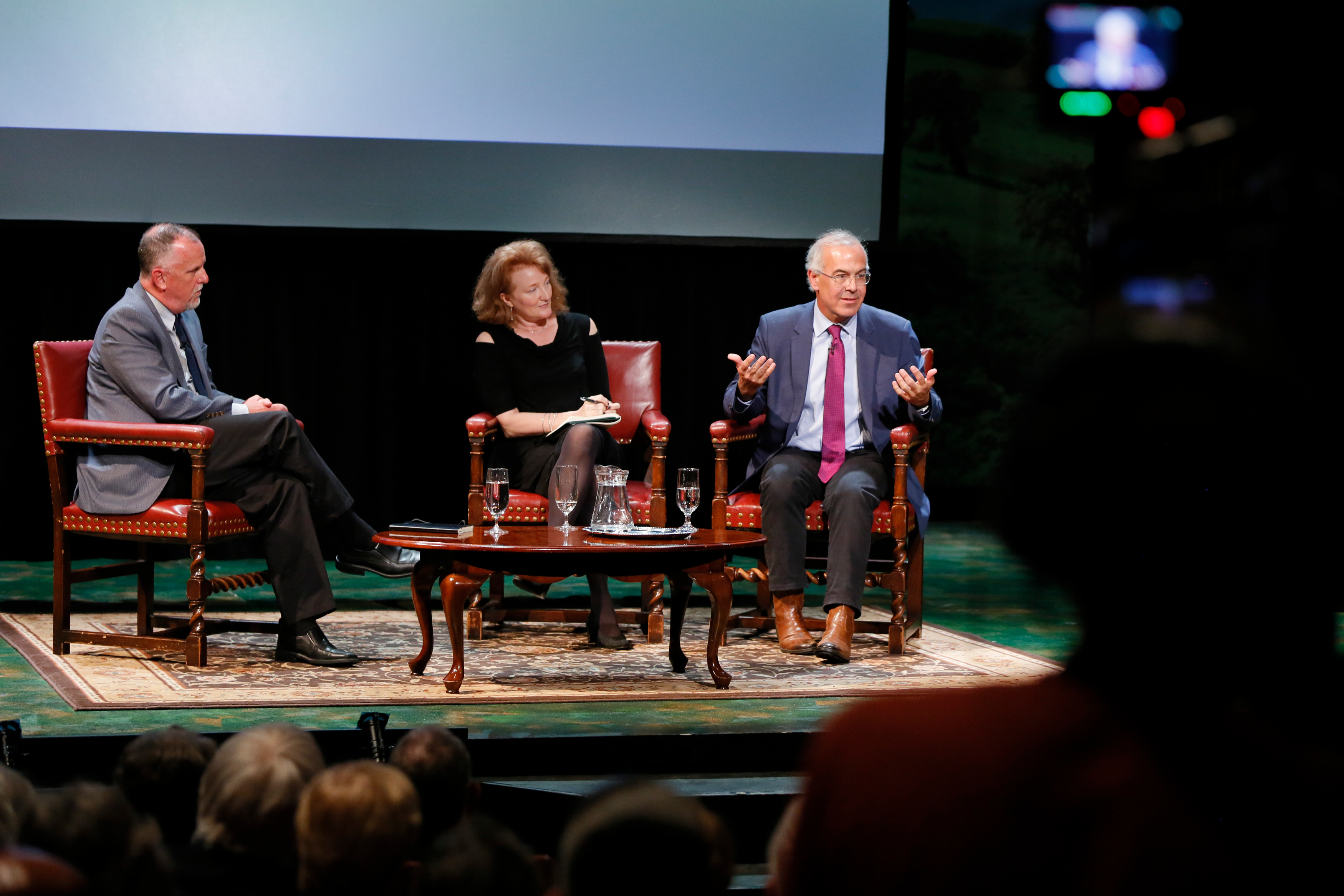Humility is no longer a value that is rewarded in the political arena and it’s up to individuals to re-introduce it as an important character trait in public life, an effort that could “trickle up” into political leadership.
That was the message Tuesday evening as prominent political figures, journalists, educators, academics and nonprofit leaders came together for a public forum, titled “Humility in Politics,” in Washington, D.C.

The event, sponsored by UConn’s Humanities Institute and supported by a $5.75 million grant from the John Templeton Foundation, kicked off a three-year research initiative, aptly named The Humility and Conviction in Public Life project.
The project aims to investigate how intellectual humility – being aware of our own innate biases and being responsive to new evidence – can overcome current political divisiveness.
“This is an unprecedented attempt to apply humanities and social science research to solve problems in the political sphere,” said Michael Lynch, professor of philosophy and director of the Humanities Institute.
Culture of Bluster
Panelist Liz McCloskey of the Danforth Center on Religion and Politics at Washington University told the crowd at the Folger Shakespeare Library that one way to embody humility is by listening attentively, admitting your limitations, and crediting others for their successes – all attributes rarely seen on the political stage – and especially absent from the 2016 presidential race.
Right now, humility is counter-cultural. It shouldn’t be. — Liz McCloskey
“Right now, humility is counter-cultural,” she said. “It shouldn’t be.”
Jelani Cobb, panelist, professor of journalism at Columbia University and contributor to the New Yorker, added that ambiguity makes people uncomfortable, which pushes politicians to lean toward conviction rather than the uncertainty that often accompanies humility.
“We tend toward explanations rather than ambiguity, regardless of the quality of those explanations,” he said. “The humility of saying ‘we don’t know’ is unappealing to some people.”
Humility also isn’t rewarded in the public arena, said panelist Krista Tippett, host of NPR’s On Being, which can lead to more and more bluster that’s mistaken for confidence.
“We have to practice in our everyday interactions – practice letting go of our own baggage, and really listening to others without judgment,” said Tippett.
The panel concluded that only through deliberate individual habits can Americans begin to re-introduce humility as an important character trait in public life.
“There’s no political advantage to admitting you’re wrong,” agreed panelist David Brooks of the New York Times.
Instead of looking to political leadership to model a balance between conviction and humility, Brooks said, people should model humility in their individual relationships with others. Educators, too, should prioritize the use of humility in the classroom.
Influencing Education
Alumna Joyce Scott ’64 (CLAS) traveled from Colorado to attend the event. As a former French major, educational leadership professor and vice provost for academic affairs at Texas A&M University, she appreciated the emphasis on the value of a humanities education.
“I’m excited to see what the College of Liberal Arts and Sciences is doing to put these important questions out there,” she said. “It’s so important to get people talking about these larger issues that center around the humanities, especially this year. We need to model a higher level of discourse for our politicians.”
She credits UConn with providing a high caliber of exposure to the liberal arts for all students.
“UConn has managed to maintain the centrality of a liberal arts education, and I strongly believe that’s what distinguishes it from many other public universities,” she said.
Parag Joshi, who teaches history at Connecticut’s Manchester High School, and Christopher Newell, Education Supervisor at the Connecticut Mashantucket Pequot Museum, both saw the event as a welcome opportunity to expand the way they teach about history and cultural competencies.
“It’s an essential part of the ethos in my classroom that people disagree and have their ideas challenged in a civil, respectful way,” said Joshi. “I want them to engage in the world of ideas, not just a world of consumerism and fame. So I teach them that reasonable people can disagree.”
Joshi and Newell attended the Humility and Conviction in Public Life project’s summer Upstander Academy in August, which brought educators from around the state to Storrs to learn about encouraging civil discourse over difficult issues, such as genocide and racial bias, in the classroom.
“As an educator, humility is your biggest tool,” said Newell. “We all have biases, so emphasizing humility allows students to grow. I want to be able to give students something they will keep talking about on the bus ride home.”
He credits UConn with leading a state-wide charge to change the way educators think about argument in the classroom.
“UConn has a huge role in creating these types of conversations, as the flagship university in the state and a leader in the academic world,” he said. “It’s influencing other areas of education around the state, which is an incredible resource.”
Throughout the coming year, the Humility and Conviction in Public Life project will sponsor research initiatives spearheaded by UConn faculty and students across the disciplines of political science, philosophy, public policy, journalism, Africana studies, and other areas. The project will also announce the winners of an international, $2 million funding competition facilitated by the UConn Humanities Institute, in January 2017.



